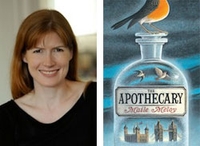In evanescent scenes distinguished by clean, wry prose, Meloy observes the Santerre family, whom readers met in 2003's Liars and Saints
, from a crafty new angle. The book opens as the deeply Catholic Yvette Santerre frets over her granddaughter, Abby, who has the chicken pox and has been deposited in Yvette's care while her mother, Clarissa, tries to remember what it's like to feel happy. Yvette and Teddy's eldest daughter, Margot, is repressed by her own Catholicism and veering into adultery; Clarissa thinks of her husband, Henry, and daughter, Abby, as "captors" keeping her from realizing her true potential; and happy-go-lucky son Jamie has little ambition beyond his next girlfriend. With Abby at the story's center, the narrative moves forward years in effortless leaps, revealing the secrets and dissatisfactions of all. From Abby's rocky childhood to her bruising young adulthood (her parents divorce; her father is killed in a car accident), she finds solace with Jamie, 12 years her senior. When Abby is 21, uncle and niece fall into an affair, until Jamie is lured away by the bored, rich, chronically unfaithful Saffron, who suffers her own difficult mother crisis in Argentina. Clarissa takes up with a lesbian and confronts her mother with recovered memories; Jamie becomes convinced he's actually Margot's daughter; and dreamy, conflicted Abby writes a roman à clef (Liars and Saints
!) about them all. Meloy shifts point of view fluently, and though her characters weather all sorts of melodrama, the novel itself feels light—poignant and affecting, meaningful yet somehow weightless. (Feb.)


